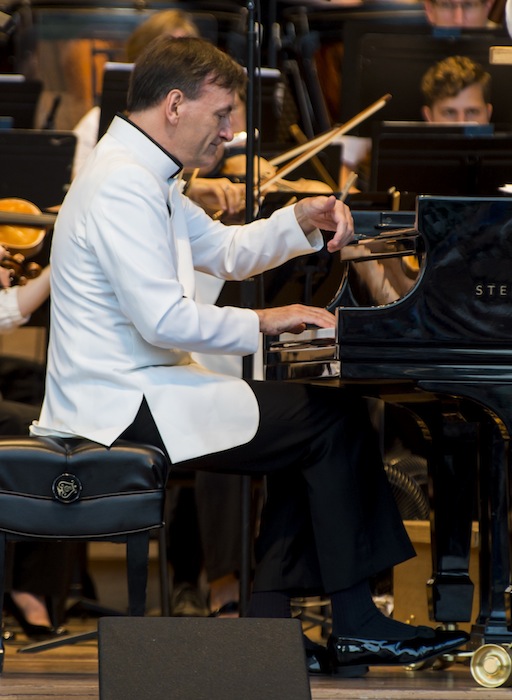Hough provides the highlights in varied Grant Park program

The last couple weeks of Grant Park Orchestra programs contained more pops-concert fluff and crossover ephemera than one expects from Chicago’s most discerning and adventurous summer music festival.
Not all of Wednesday night’s program at the Pritzker Pavilion plumbed profound musical depths either. But with the return of Carlos Kalmar to lead the final three weeks of the lakefront festival, and joined by one of our finest pianists, the evening contained more hits than misses.
Stephen Hough is among the most consistent and rewarding keyboard artists of our day and his integral sets of concertos by Rachmaninoff, Saint-Saëns, and Mendelssohn remain recording touchstones.
Rachmaninoff’s Rhapsody on a Theme of Paganini benefited from the British pianist’s singular brand of controlled spontaneity. Apart from a curiously offhand initial statement of the famous 18th variation, Hough proved a wholly sympathetic soloist in this beloved work. The British pianist drew out the lyrical Russian languor and his nervy virtuosity made the closing variations exhilarating, ending with a nice, insouciant lift to the final notes. Kalmar was an admirable partner though there were times when coordination between soloist and orchestra could have been more tightly woven.
After the enthusiastic curtain calls, Hough and Kalmar returned for a surprise bonus—nothing less than Lutoslawski’s Variations on a Theme of Paganini, based on the same violin caprice as the foregoing Russian work. Only at Grant Park.
In his brief introduction, Hough said that Lutoslawski adds “a little more tabasco” to Paganini’s 24th Caprice. Indeed, the Polish composer’s variations, originally cast for two pianos, clearly hail from the late 20th century and are imbued with astringent bite and innumerable solo complexities. Befitting the work, Hough’s performance was even more blazingly virtuosic than the Rachmaninoff that preceded it, enhanced by equally fiery and committed support from Kalmar and the orchestra.
The evening was framed by two greatly varied showpieces.
Last summer Kalmar led the Chicago premiere of James MacMillan’s Quickening, a substantial work for chorus and orchestra. MacMillan’s Brittania, heard Wednesday, is in a different vein entirely.
Brittania sounds like a darkly satiric deconstruction of Edwardian England and the days of British empire. Riffing on an obscure 18th-century English march, the Scottish composer mixes the brew with a Cockney drinking song and Irish fiddle reel–well played by Jeremy Black–while cocking snooks at Thomas Arne and Elgar’s Cockaigne Overture. Yet despite the manic marches, police whistles, hansom cab frenzy and assorted mayhem, the end result comes across as more sourly peevish than wittily subversive. Kalmar led an energized performance but Brittania is not among the gifted MacMillan’s more essential works.
Jacques Ibert’s Escales (“Ports of Call”) closed the evening. The French composer’s breezy Mediterranean travelogue may not be deep or accurate in its ethno-musical inspirations, but it made a lively enough closer. The playing could have used greater polish, but the Grant Park winds made the most of their opportunities–notably the opening flute passage and the extended “Tunisian” oboe solo, a kind of febrile hoochie-koochie dance. The Spanish-flavored final section rounded off the work with ample swagger and exuberance.
Carlos Kalmar leads the Grant Park Orchestra and Chorus in Mozart’s Mass in C minor and the world premiere of Michael Gandolfi’s The Cosmic Garden in Bloom 6:30 p.m. Friday and 7:30 p.m. Saturday at the Pritzker Pavilion. gpmf.org.
Posted in Performances




